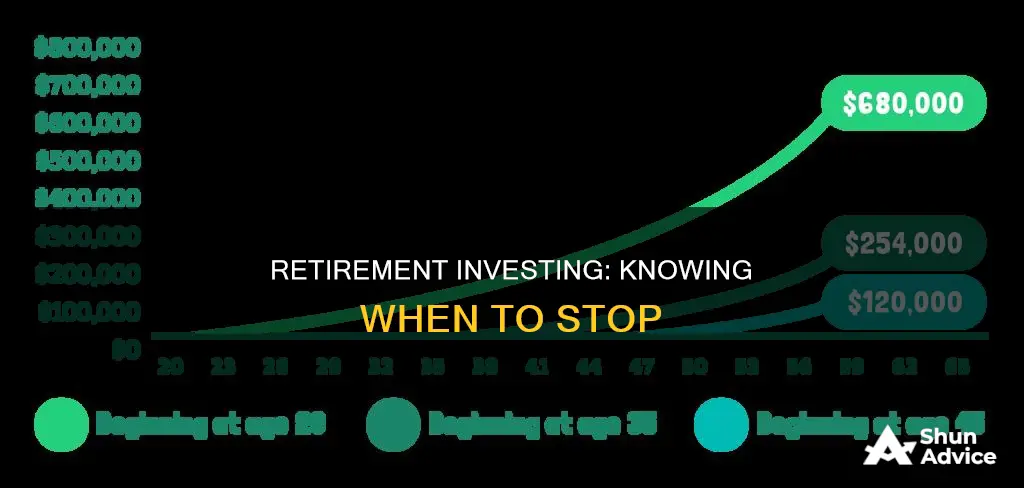
Knowing when to stop investing for retirement is a complex question that depends on a variety of factors. While there is no one-size-fits-all answer, there are some general guidelines and considerations to keep in mind. Firstly, it is recommended to start saving for retirement as early as possible to take advantage of compound interest and maximise the potential growth of your investments. This means that those who start saving early may be able to stop investing sooner. Additionally, being debt-free and having sufficient emergency funds in place are important considerations when planning for retirement. It is also crucial to strike a balance between stocks and safer investments, such as bonds, to manage risk and maintain growth potential. Seeking advice from a trusted financial advisor can help individuals navigate the complexities of retirement planning and make informed decisions about when to stop investing.
| Characteristics | Values |
|---|---|
| When to stop saving for retirement | When you are debt-free and your retirement income covers your expenses and inflation |
| How to spend your nest egg | Don't penny-pinch, as it can lead to health problems; spend on valuable experiences |
| How much to spend in retirement | 70% to 80% of annual income when working; $40,000 to $80,000 per year of expenses, including healthcare and retirement facilities |
| How to balance your portfolio | 60% stocks and 40% bonds; or use the rule of 110, subtracting your age from 110 to get the percentage of your portfolio that should be in stocks |
| When to withdraw from your retirement savings | Withdraw strategically to make money last; financial experts recommend a withdrawal rate of 4% per year |
| How to avoid running out of money | Save at least 10% to 15% of total income for retirement; contribute to a 401(k) or IRA |
| How to handle major life events | Don't stop investing, but pause if necessary to rebuild your emergency fund |
What You'll Learn

You're in debt
If you're in debt, it's advisable to stop investing for retirement temporarily and focus on paying off your debt. Being in debt can be compared to being handcuffed to an iron ball, and pushing pause on investing is the best way to get rid of that chain. Your income is your most important wealth-building tool, and if it's tied up in debt, it will be challenging to build wealth.
- Evaluate your debts: Make a list of your debt balances, minimum monthly payments, and interest rates. Focus on paying off debts with high-interest rates, such as credit card balances, as these can be detrimental to your financial health.
- Build an emergency fund: Before investing for retirement, ensure you have an emergency fund to cover unexpected expenses. Aim to save three to six months' worth of living expenses in a high-interest savings account. This will prevent you from dipping into your retirement fund or relying on credit cards in case of emergencies.
- Prioritize debt repayment: Create a debt repayment plan and make it a regular practice. Consider using the snowball method, which involves paying off the debt with the smallest balance first to quickly eliminate one bill and build momentum.
- Refinance or consolidate debt: Look into options for refinancing or consolidating your debt to lower interest rates or extend repayment terms, making it more manageable.
- Increase income and reduce expenses: If possible, consider taking on additional work or selling unwanted items to boost your income. Also, evaluate your spending habits and cut back on non-essential expenses to free up more money for debt repayment.
- Seek professional advice: Consult a financial advisor or credit counselling services for personalized guidance based on your circumstances. They can help you create a debt management plan and provide support throughout your financial journey.
Remember, this is a temporary pause on your retirement investing journey. Once you've addressed your debt, you can resume investing with renewed focus and intensity.
The Great Debate: Investing vs. Loan Repayment
You may want to see also

You don't have an emergency fund
Even if you are investing for retirement, it is important to have an emergency fund. Financial advisors generally recommend having three to six months' worth of expenses in an emergency fund, but this may not be enough when you retire. In retirement, your emergency fund will serve as a buffer for large, unexpected expenses, and it can also protect you if the value of your investments drops.
As a retiree, you may want to set aside one to two years' worth of living expenses in an emergency fund. This is because retirees often have a significant portion of their savings in investments, and an emergency expense could force them to withdraw at an unfavourable time, such as during market downturns or recessions. An emergency fund can help you pay your monthly expenses without dipping into your investment portfolio or breaking contracts on CDs and annuities, which may have early withdrawal penalties.
It is also important to keep your emergency fund in an account that is easily accessible, such as a basic savings or checking account. This will ensure that you can quickly access your money in an emergency.
If you don't have an emergency fund, you may be forced to sell your investments at a loss to cover unexpected expenses. This could significantly shorten the longevity of your portfolio. Therefore, it is important to prioritize building an emergency fund, even if you are already investing for retirement.
Smart Places to Invest $10K
You may want to see also

You're saving for a home
Saving for a home and saving for retirement are both important financial goals. However, if you're at a point where you need to prioritise one over the other, it's generally recommended that you focus on building up your retirement fund first.
This is because, historically, stock market gains over 20-25 years or more far outpace real estate gains. For example, the S&P 500 gained more than 1,000% over a 24-year period, while the average increase in real estate prices between 1980 and 2004 was 274%.
That being said, it is possible to save for both a home and retirement at the same time. This requires careful planning, prioritisation, and budgeting. Here are some tips to help you save for a home while also investing for retirement:
- Consider your financial priorities: Evaluate your personal goals and circumstances, such as your age, current and potential future income, your spouse or partner's contribution, and your timelines for retirement and purchasing your first home. This will help you determine how much you need to save and how to allocate your savings.
- Create a budget and stick to it: Make a realistic budget that takes into account your income, needs, wants, and savings goals. The 50/30/20 budget rule is a popular methodology that can help you save for retirement while paying off debt. This involves dividing your after-tax pay into three categories: 50% for needs (housing, transportation, groceries, utilities, minimum debt payments), 30% for wants (entertainment, eating out, gym memberships, travel), and 20% for savings (debt repayments beyond the minimum, retirement funds, emergency funds).
- Reduce your debt: Focus on paying off high-interest debts to improve your credit score and make it easier to get a good mortgage rate or loan. Try to keep your debt-to-credit ratio lower than 36%.
- Automate your savings: If your employer offers a 401(k) or 403(b) retirement plan, especially one with employer-matching opportunities, sign up for it. Automating your monthly payments can help ensure that you don't skip a payment to your retirement fund.
- Don't give up on employer matching: Any employer match you receive is like "free money" and can be a vital tool in your retirement savings plan. Capturing this match can help make up for any reduction in your savings rate due to also saving for a home.
- Determine how much to save for a home: The average down payment for first-time homebuyers is around 8%, but you may be able to secure a mortgage with as little as a 3.5% down payment through government-insured programmes like Federal Housing Administration (FHA) loans. If you're in the military or a veteran, you may qualify for a mortgage loan from the U.S. Department of Veterans Affairs (VA) with zero down.
- Diversify your assets: While home equity is an important asset in retirement, it shouldn't be your only one. Consider investing in other assets such as certificates of deposit (CDs), savings accounts, mutual funds, or real estate.
- Seek professional advice: A fee-only financial advisor or planner can help you create a personalised plan based on your unique circumstances. They can assist you in creating a budget, deciding on savings vehicles, and making a timeline for meeting your goals.
Remember, saving for retirement and saving for a home don't have to be mutually exclusive. By carefully planning and prioritising your financial goals, you can work towards achieving both.
Investing in Commodities: Why?
You may want to see also

You lose your spouse
Losing a spouse is a difficult situation that no one wants to think about. However, when it happens, your financial picture will change, and you need to be prepared. Here are some things to keep in mind if you find yourself in this situation:
First, don't make any important financial decisions right away. Give yourself time to process your emotions and grieve. Life insurance policies, inherited retirement funds, and alimony or child support payments will impact your budget, so it's crucial to have a clear head when handling these matters.
Second, understand that it will take some time to fully grasp your new financial situation. You need to know the amount of life insurance, whether you will be receiving or paying child support, and how much. These factors will significantly influence your financial decisions moving forward.
In the meantime, focus on paying the bills and ensuring your basic needs, such as food, are met. Avoid making any significant investments or financial changes until you have a clear understanding of your new financial picture and feel emotionally ready to make those decisions.
Remember, it's okay to seek professional help. Consult a financial advisor or accountant to navigate market chaos, inflation, and your future financial plans. They can provide valuable guidance and help you make informed choices during this challenging time.
While it's important to be mindful of your financial situation, don't forget to prioritize your emotional well-being. Give yourself time to heal and process your loss. You can gradually adjust to your new circumstances and make informed decisions about your retirement investments when you feel ready.
GameStop Stock: Buy or Bye?
You may want to see also

You have other major life events
Life is unpredictable, and unexpected events can significantly impact your retirement plans. For instance, a job loss or a major medical emergency can force you to dip into your emergency funds. In such cases, it is advisable to temporarily pause your retirement investments and focus on rebuilding your emergency savings. Remember, this is only a temporary measure, and you should aim to get back on track with your retirement investments as soon as possible.
Another example of a major life event that can affect your retirement planning is divorce. Divorce can impact your retirement in several ways, including changes in household income and the division of assets. It may require you to revise your retirement goals, increase your savings rate, or even delay retirement to rebuild your funds.
It's important to be proactive and prepare for potential life events that could disrupt your retirement plans. This includes regularly reviewing and adjusting your retirement goals, creating and maintaining an emergency fund, diversifying your investments, and seeking professional financial advice when needed. By being prepared, you can minimise the impact of unexpected life events on your retirement savings.
Additionally, government programs and resources are available to provide assistance during challenging times. For example, unemployment benefits can help during a job loss, and Medicare and Medicaid can offer financial support for health emergencies. Seeking out these resources can help you manage your finances and protect your retirement savings during difficult periods.
Retirement Planning: Navigating the 403(b) and Beyond
You may want to see also
Frequently asked questions
You should stop investing for retirement when you are debt-free, and your retirement income covers your expenses plus any inflation.
No, you should not invest your emergency fund. You should have a fully funded emergency fund before investing for retirement.
Most experts suggest that at least 10% to 15% of your total income should go into retirement savings over your working life.







